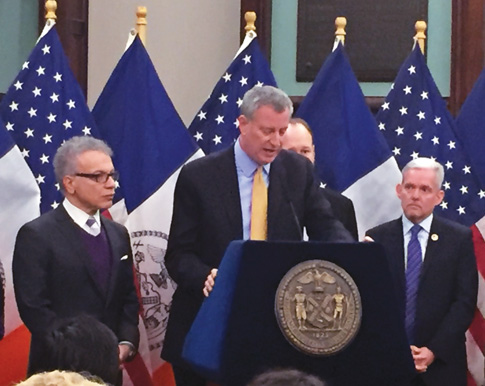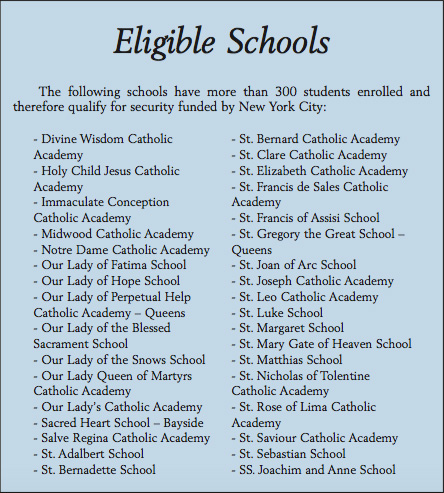
A new law is set to protect students in non-public schools, including 34 eligible Catholic elementary schools in Brooklyn and Queens.
Starting April 1, private and religious schools with more than 300 students will be able to hire security guards and be reimbursed by New York City. Under the new law – signed Jan. 5 by Mayor Bill de Blasio – the city will pay up to $19.8 million in reimbursements to the schools.
“(The legislators) realized and recognized the importance of keeping our children safe in all non-public schools as well as public schools,” said Anne-Marie Baumis, diocesan associate superintendent for government programs and services. “This added measure provided us with a little peace of mind.”
Council member David Greenfield (D-Borough Park-Midwood-Bensonhurst), sponsor of the Introduction 65-A bill, has said the new law will protect as many as 200,000 children attending non-public schools.
The passage of the bill is even more important in light of the recent terror attacks worldwide and the scores of shootings reported across the United States last year.
“We have been fortunate in that we have not had major security issues in many of our buildings but that is no reason to wait,” Anthony Biscione, senior deputy superintendent of schools, said in an interview with NET-TV. “Our schools should take advantage of the opportunity to have the security guards in their buildings.”
Currently, every city public school receives security provided by NYPD school safety agents. The new law will ensure that students in independent and religious schools also have strengthened security.
“Today we are saying that we want every child to learn in a safe school environment by giving them school security officers just like public schools,” Greenfield said during a press conference before the vote in December.
The push for a law to protect students has been in the works for over three years, when Greenfield first introduced a similar bill.
He was driven to make the measure a reality after the Sandy Hook school shooting in Newtown, Conn., where 20 children and six adults were killed in 2012.
The bill had the support of members of the Jewish, Muslim and Catholic communities, including the Diocese of Brooklyn and Archdiocese of New York. After months of advocacy, the bill was passed by the City Council, 43-4, last month.
“I am very proud to have been a part of the broad coalition that went into action to advocate for passage of this important bill to help secure non-public schools all over New York City,” said Vincent D. LeVien, director of external affairs for DeSales Media Group, the communications arm of the Diocese of Brooklyn and parent company of The Tablet and NET-TV. “The first of its kind legislation establishes a precedent for funding security guards for Catholic schools. Catholic school students deserve to be just as safe and secure as public school students and this bill helps make that happen.”

Each non-public school will be able to hire an unarmed security guard from a state-licensed security guard agency. Security guards must be registered with the state, paid the prevailing wage and be trained for work in elementary schools. Schools with more than 500 students could get a second security guard.
“It’s so wonderful to know that our students will be protected,” Baumis said. “Parents, teachers, principals, everybody is thrilled that this is happening.”
Maura Lorenzen, principal of St. Saviour Catholic Academy, Park Slope, said the measure will allow them to add another security guard to make their school more secure.
“Safety is important to everyone, all the children living in New York,” Lorenzen said.
She appreciated that the schools will have a choice in selecting the guards so they can make sure they are on board with the school’s mission.
But the bill was not without controversy. Detractors of the bill, including a member of the New York Civil Liberties Union, argued that the city should not use tax-payer dollars to pay for security guards at private and religious schools and that doing so signaled support of religious institutions.
In response to the controversy, Baumis said that those opposing the measure need to remember that “all of the parents, regardless of the school, are tax-payers” and that students should be safe regardless of where they go to school.
Council member Greenfield also responded to the controversy by pointing out that in public schools NYPD has provided security officers for years to make sure the children are 100 percent safe.
“All this bill does is provide that same level of security to 200,000 children who attend non-public schools,” he said via email. “At a cost of less than $20 million a year, in a budget of $78.5 billion, securing all of New York City’s children is certainly a worthwhile investment. The reality is that our city spends on a multitude of priorities ranging from immigration to housing to homelessness. None of those funds are taken away from public schools, neither are these funds.”
Currently the State of New York reimburses funds for security equipment such as cameras and locks, Baumis said. She added that all of the Catholic elementary schools in the diocese have crisis management plans in place in case of an emergency and that the security guards in the eligible schools would also help to strengthen these emergency plans.
“This is an added measure to make sure the schools are as safe as possible,” she said.

It’s nice to see that people are finally realizing that the key to making schools safer is increased security, not turning them into gun-free zones aka fish in a barrel for any would-be school shooter.
Is there a way to contact this security in the catholic schools?